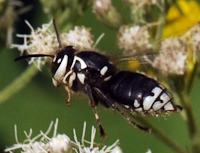 This
critter of the species, Dolichovespula maculata,
is important to those of us who work in our landscapes
because they have a habit of making their papery nests
in our trees and shrubs. The bald faced hornet which is
also known as white faced hornet, white tailed hornet,
blackjacket or the bull wasp is a wasp or yellow jacket
(not a true hornet) that is native to
North
America.
This
critter of the species, Dolichovespula maculata,
is important to those of us who work in our landscapes
because they have a habit of making their papery nests
in our trees and shrubs. The bald faced hornet which is
also known as white faced hornet, white tailed hornet,
blackjacket or the bull wasp is a wasp or yellow jacket
(not a true hornet) that is native to
North
America.
They produce the classic
football shaped paper nest that "suddenly" shows up when
the leaves drop from the trees in the fall. Actually,
they have been there all season long getting larger and
larger but we did not notice them. They went about their
business while you went about yours without disturbing
their nest.
Each spring, the "queens"
who have survived the winters, select a site and build a
new nest. They do not reuse nests from the previous
season. Once they get started, they begin to produce new
workers and, by the end of the summer, there may be as
many as 300 or more individuals in the nest. Their only
goal in life is to produce a handful of fertilized
queens who will live to start new nests the next year.
After heavy frosts kill off their prey, all the other
hornets in the nest will die and the queens leave to
find a safe place to over winter. The nest then
disintegrates over the winter...unless it is used for a
school science project.



